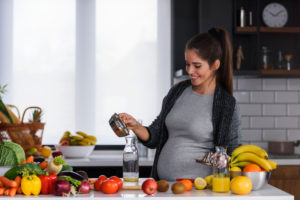Pregnancy Immune Support
 Any expectant mother’s goal is to deliver a safe and healthy baby, and the work to achieve that begins as soon as a woman realizes she is pregnant. From prenatal vitamins to diet changes, and more that are discussed here, women employ a variety of methods to boost their immune system during pregnancy. Did you know that your body actually lowers its immune defenses upon pregnancy to allow the fetus to grown? As a result, of course, your immune system becomes weaker and needs some extra support. This is especially important now, when COVID-19 poses an extra threat to individuals with a weakened immune system.
Any expectant mother’s goal is to deliver a safe and healthy baby, and the work to achieve that begins as soon as a woman realizes she is pregnant. From prenatal vitamins to diet changes, and more that are discussed here, women employ a variety of methods to boost their immune system during pregnancy. Did you know that your body actually lowers its immune defenses upon pregnancy to allow the fetus to grown? As a result, of course, your immune system becomes weaker and needs some extra support. This is especially important now, when COVID-19 poses an extra threat to individuals with a weakened immune system.
Immune Support Techniques
- Prenatal Vitamins: During pregnancy, not only do you have a weakened immune system, but you also need to be careful with your diet. This can often make it difficult to have a healthy intake of necessary nutrients, so taking prenatal vitamins recommended by your doctor is a good way to ensure you are boosting your immune system and your overall health. In fact, it’s ideal to get on prenatal vitamins when you start trying to conceive.
- Hydration: Staying hydrated is a good way to avoid illness and to help alleviate symptoms of it if you get sick. Our bodies need water, so extra intake of water ensures that your immune system runs effectively. Though there can be other sources, avoid drinks high in sugar or caffeinated beverages.
- Diet: A diet high in fruits, vegetables, and proteins has the ability to naturally boost your immune system and help you get better if you get sick. Avoid foods with high sugar percentages and other carbohydrates. This way, you are ensuring you are consuming the necessary vitamins and minerals.
- Rest: Though self-explanatory, a good night’s sleep goes a long way in boosting your immune system and in making sure your body is getting enough energy to stay healthy and to sustain a growing baby.
- Humidifier: Not only can humidifiers help alleviate cold symptoms, they also keep the air pleasantly moist and generally cleaner.
Pregnancy and COVID-19
Because pregnancy can cause a lower immune system, it follows that the risk of contracting COVID-19 is higher. At this moment, the World Health Organization does not specify different protection measures against COVID-19 for pregnant women, but it does caution to the higher risk the virus poses to pregnant women.
As is recommended:
- Wash your hands frequently with soap and water or with an alcohol-based hand rub.
- Keep recommended space between yourself and others and wear a fabric mask.
- Avoid crowded spaces.
- Avoid touching your eyes, nose, and mouth.
- Practice respiratory hygiene by covering your mouth and nose with your elbow should you need to sneeze.
